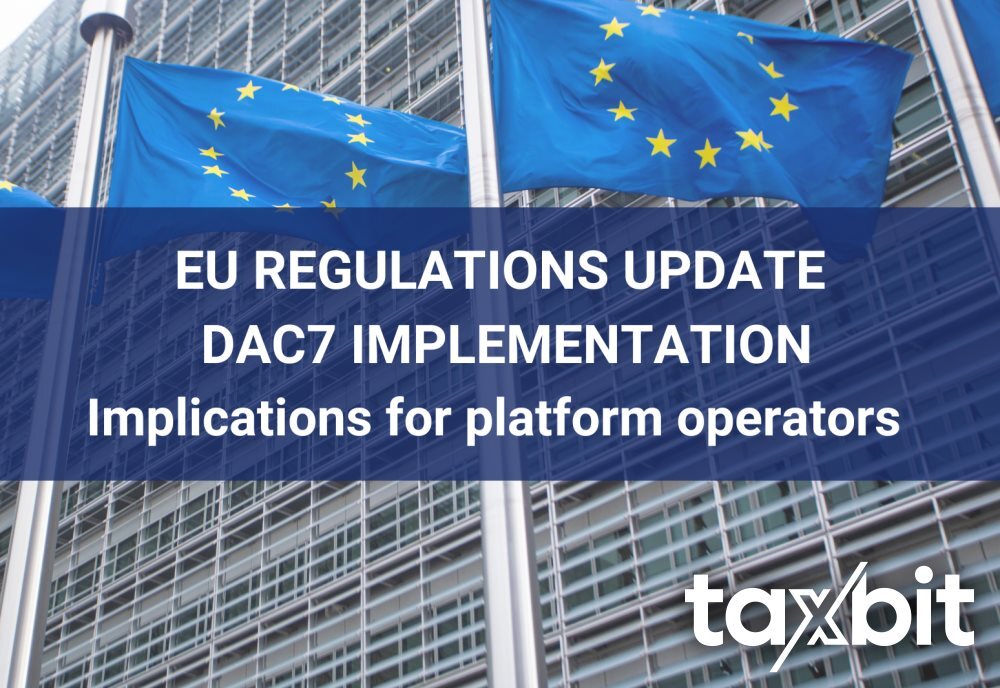Navigating the Complexities of DAC7
As the digital economy continues to expand, businesses operating on digital platforms face increasing regulatory challenges. One such challenge is the implementation of DAC7, the European Union’s directive aimed at enhancing tax transparency and cooperation in the digital realm. In this blog post, we will explore the intricacies of DAC7 and the complexities that digital platform operators must navigate to ensure compliance with the directive.
Continue reading the article to find out
- What is DAC7?
- Who needs to comply with DAC7?
- What kind of data do you need to collect, verify and report?
- How to prepare for DAC7 changes?
Understanding DAC7
DAC7, or Directive on Administrative Cooperation (DAC) 7, is a regulatory framework introduced by the European Union. It focuses on gathering and reporting data about natural and legal entities, specifically related to their earnings, through digital platforms and marketplaces. The directive aims to promote transparency, reduce tax evasion risks, and create a level playing field for businesses operating in the digital economy.
Reporting Obligations & Data Required for DAC7
Relevant Activity
Under DAC7, digital platform operators are required to report sellers or gig workers who fall into one or more of what is considered as “relevant activity” under the rules. That relevant activity can include the following:
- Rental of immovable property
- Personal services
- Sale of goods
- Rental of means of transportation
Who is Reportable
Digital platforms will also need to determine a sellers tax residency in determining who is in scope for reporting. Currently, there is no prescribed manner of collecting this information or required documentation. The rules do indicate that platforms will need to collect this tax residency information by the end of each reporting year, and introduce a unique problem that platforms will need to address in terms of when they require this information – at onboarding or later in the customer lifecycle.
What is Reportable
Digital platforms and marketplaces will need to be prepared to collect and report extensive data to the relevant tax authorities including, but not limited to:
- Seller name, addresses, tax identification numbers and dates of birth
- VAT identification numbers
- Business registration numbers
- EU member state of residence.
- Financial account identifier.
- Number of activities and transactions
- Total consideration paid or credited per year
- Any taxes, commissions, or fees. In case the marketplace has withheld any funds each year
- The address and land registration number for each property listing
- The number of days each property was rented
- Address and land registration number of each property
The marketplace operator of the platform will be held responsible for the accuracy and reliability of the collected data.
DAC7 Compliance Challenges
Determining Applicability: The first challenge is to analyze whether the platform falls under the reporting obligations outlined in DAC7. Platform operators need to assess the nature of their services, the types of transactions facilitated, and the thresholds set by the directive to determine their compliance requirements.
Data Collection and Verification: Digital platform operators must establish robust systems and processes to collect and verify the required information from their sellers. This includes obtaining accurate transaction and customer data, and ensuring the completeness and integrity of the reported information.
Data Protection and Privacy: With the collection and processing of sensitive data, platform operators must ensure compliance with data protection regulations. They need to review their data handling practices, update privacy policies, and implement appropriate security measures to safeguard user information.
Adapting Systems and Processes: DAC7 may require significant adjustments to existing systems and processes. Platform operators must invest in technology and infrastructure to capture, store, and transmit the necessary data to tax authorities in a standardized format and within the specified timelines.
DAC7 Compliance with Taxbit
By leveraging the capabilities of Taxbit, digital platform operators can streamline their DAC7 compliance processes, reduce the burden of manual reporting, and mitigate the risk of non-compliance. Ultimately, this enables operators to focus on their core business activities while ensuring transparency and adherence to tax regulations. With the support of Taxbit, operators can navigate the complexities of DAC7 more effectively, embrace transparency, and contribute to a fair and compliant digital marketplace in line with the EU’s goals for tax cooperation and transparency.
.png)


